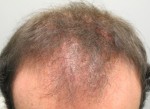Q: What is Lichen planopilaris? — G.S., Pleasantville, NY
A: Lichen planopilaris (LPP) is a distinct variant of cicatricial (scarring) alopecia, a group of uncommon disorders which destroy the hair follicles and replace them with scar tissue. LPP is considered to have an autoimmune cause. In this condition, the body’s immune system attacks the hair follicles causing scarring and permanent hair loss. Clinically, LPP is characterized by the increased spacing of full thickness terminal hairs (due to follicular destruction) with associated redness around the follicles, scaling and areas of scarred scalp. In contrast, in androgenetic alopecia (AGA) or common baldness, one sees smaller, finer hairs (miniaturization) and non-inflamed, non-scarred scalp. Complicating the picture is that LPP and AGA can occur at the same time – particularly since the latter condition (common baldness) is so prevalent in the population (see photo). And LPP can involve the frontal area of the scalp, mimicking the pattern of common genetic hair loss. Interestingly, the condition is more common in women than in men.
For those considering a hair transplant, ruling out a diagnosis of LPP is particularly important as transplanted hair will often be rejected in patients with LPP. In common baldness, the disease resides in the follicles (i.e., a genetic sensitivity of the follicles to DHT). Since the donor hair follicles remain healthy, even when transplanted to a new location, we call common baldness donor dominant. It is the reason why hair transplantation works in persons with common baldness. In contrast, LPP is a recipient dominant condition. This means that the problem is in the recipient area skin, so if healthy hair is transplanted into an area affected by LPP the hair may be lost.
Because it is so important to rule out suspected LPP when considering a hair transplant and because it is often hard to make a definitive diagnosis on the physical exam alone, a scalp biopsy is often recommended when the diagnosis of LPP is being considered by your doctor. A scalp biopsy is a simple five minute office procedure, performed under local anesthesia. Generally one suture is used for the biopsy site and it heals with a barely detectable mark. It takes about a week to get the results. The biopsy can usually give the doctor a definitive answer on the presence or absence of LPP and guide further therapy. If the biopsy is negative, a hair transplant may be considered. If the biopsy shows lichen planopilaris, then medical therapy would be indicated.
Posted by

 LPP in Male Pattern Alopecia
LPP in Male Pattern Alopecia



